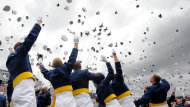(Image credit: Jewel Samad/AFP/Getty Images)
COLORADO SPRINGS, Colo. - Eight months after a repeal of the military's "don't ask , don't tell" policy, the U.S. Air Force Academy today graduated its first group of openly gay cadets.
As President Obama addressed the graduates, no rainbow flags could be seen on display. The LGBT students couldn't be picked out of the crowd of white and blue.
But gay and lesbian advocates, academy alums, school officials and current students said they were there.
"The whole thing is we don't want to be identified as anything different," said Trish Heller, who heads the Blue Alliance, an association of LGBT Air Force Academy alumni. "We want to serve, to be professional and to be symbols of what it means to be Air Force Academy graduates."
Heller said her group had connected with at least four members of the
class of 2012 receiving diplomas today who had come out publicly as
lesbian, gay, bisexual or transgender. There were likely others, but
they preferred to keep a low-profile, she said.
Conversations with dozens of current academy students and some new
graduates presented a picture of a smooth transition from the military's
ban on openly gay service members serving to the repeal of that ban.
There have been no major incidents of overt discrimination or
harassment since the policy was repealed in September.
But many signaled the change in policy would continue to hold a tender
and personal meaning for those cadets who were weighing the decision to
come out of the closet.
"It's just been really open, a lot of acceptance. I haven't heard
anyone say, 'I hate this. I can't serve in the military with this,'"
said 3rd Class Cadet Kevin Wise, a second-year management major. "It's a
sense of 'OK, this is their lifestyle, but they're still the person
I've spent 21 credit hours a semester next to or I've gone through this
with,'" he said.
Wise said he knew several classmates who chose to come out in the past
few months. "Honestly, for me, it was, 'Oh well, I kind of had a
suspicion since I've known you for two years now, but you just move on,"
he said.
"There wasn't any sort of repercussion against them or anything," said
2nd Lt. Jenny Kavalstan of her gay classmates who graduated with her
today. "I thought of them the same way I did before; most people do."
Acacia Miller, a sophomore from Shreveport, La., praised the school's
leadership for setting the right tone before the repeal. "They did a
good job preparing us. There were lots of briefings about it. They
stated how the military was going to go forward with it, how we should
act. It was pretty much just like any other repeal, segregation, all
that stuff. We just got told this is what's going to happen and we all
need to be adults about it," she said.
Gay cadets at all the U.S. military service academies have been forming
clubs and support groups, slowly making their existence known online and
at campus social events. The Air Force Academy group - called Spectrum -
was officially sanctioned earlier this month and had about 30 members
from across all classes, the organizers said.
The Air Force Academy's
administration has also allowed the Blue Alliance to have a more
high-profile role on campus. The group flew rainbow flags during a
tailgate party before a home football game in November, Heller said, and
hosted a dinner attended by the dean of faculty, Gen. Dana Born. In
February, the group participated in a campus leadership symposium, she
said.
"Things have gone very smoothly at the academies since repeal," said Sue
Fulton, a 1980 West Point graduate and spokeswoman for the LGBT
military advocacy group OutServe.
The "don't ask, don't tell" policy was approved by President Clinton
in 1993 as a compromise toward ending a long-standing ban on allowing
homosexuals to serve in the military. Gay service members could enlist
but had to keep quiet about their sexual orientation. Advocates said it
essentially forced them to live a lie.
Congress passed a law in 2010 formally ordering repeal of the policy.
After a period of preparation and training for lifting the ban, the
Pentagon gave the green light for final certification in September 2011.
"Basically, it was just another day when DADT was repealed," said Air
Force Academy spokesman John Van Winkle. "No big changes, no real
growing pains. Most of American society has become much more accepting
of the LGBT community over the years since President Clinton made the
forward-thinking choice in the early '90s to go from a strict no-gay
policy to DADT."
Advocates said they never believed the repeal would prove problematic on
campus, given that younger generations of students were generally more
accepting of homosexuality, and the military's commitment to following
the rules set by leaders.
"In dealing with cadets every day," Heller said, "the bigger issue going
forward is what every kid goes through in coming out at that age -
dealing with your family, coming to terms with yourself, what does it
mean to me personally - that is the real focus and challenge."


No comments:
Post a Comment